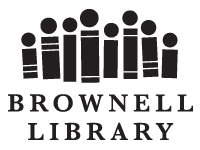Privacy Policy Statement
Background, Philosophy, Rationale
The American Library Association, in its Code of Ethics, states that libraries in the United States are in a position to Influence or control the selection, organization, preservation, and dissemination of information. In a political system grounded in an informed citizenry, libraries are committed to intellectual freedom and the freedom of access to
information.
Libraries have a responsibility to foster the free flow of ideas and information in their communities. The Brownell Library takes most seriously this responsibility to ensure intellectual freedom, and recognizes the critical need to protect the privacy and confidentiality of its users. This means that the Brownell Library will not reveal, except upon receipt of a valid and enforceable court order, subpoena or other binding legal demand (hereafter “binding legal demand”) information about users – what they read from our collections, what their areas of research might be, or what resources or services they consult, use or access (hereafter “user information”). The Brownell Library fully subscribes to the professional standard stated in the Code of Ethics of the American Library Association:
We protect each library user’s right to privacy and confidentiality with respect to
information sought or received and resources consulted, borrowed, acquired or
transmitted.
Vermont statute for protection of library records is found in the act relating to the confidentiality of patron records 22 V.S.A.§§171-173 In recognition of that public policy against open public access to library patron records, and in light of what we consider our ethical obligations as librarians, we shall not voluntarily, in the absence of a binding legal demand or extraordinary
and emergent health or safety threats, provide third parties with access to user information.
Confidential library records have long been accessible to law enforcement officials through orderly legal channels. However, passage by Congress of the
Uniting and Strengthening America by Providing Appropriate Tools Required to Intercept and Obstruct Terrorism Act of 2001 (USA PATRIOT Act, Public Law
107-56) gives law enforcement officials freer access to library user records, and increased ability to install devices on computer workstations to monitor activity.
Furthermore, it prohibits patron notification when certain types of surveillance are underway. This legislation has caused libraries, including the Brownell
Library, to review their written policies and practices regarding privacy of patron records, to rethink and codify record-keeping practices, and to ensure that staff
have coherent procedures to follow should official requests for information identifying individuals come to the library.
Accepted by Brownell Library Trustees June 18, 2024
